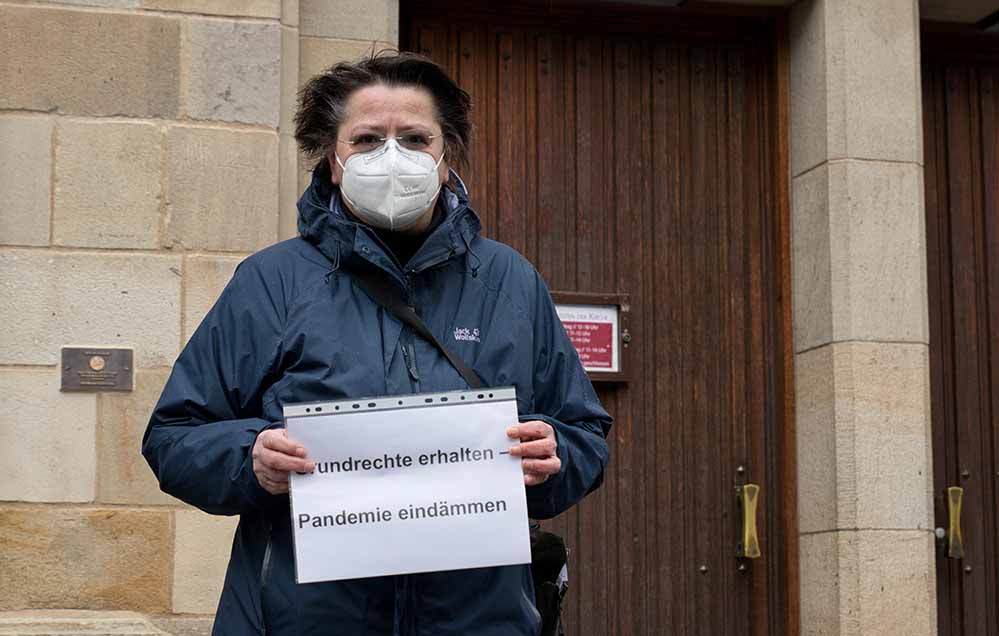“I have nothing against the Coron Protection Ordinance, but against the undermining of basic rights,” emphasizes the Dortmund plaintiff Iris Bernert-Leushacke. Photo: David Peters
–
By David Peters
The Corona Protection Ordinance of the state of North Rhine-Westphalia actually prohibits gatherings on New Year’s Eve. However, Iris Bernert-Leushacke from Dortmund did not want to accept this restriction of fundamental rights so easily and sued the higher administrative court in Münster. The court ruled that a blanket ban on gatherings was “unlawful” and “disproportionate”.
OVG does not see a blanket ban on gatherings as a means of containing the pandemic
“The Senate does not see that, even taking into account all the other protective measures taken so far, an effective containment of the spread of the corona virus disease-2019 would be significantly jeopardized without a blanket ban on gathering on New Year’s Eve,” said the court’s statement.
The state of North Rhine-Westphalia had listed as reasons for the ban that meetings can be used to circumvent the ban on celebrations. According to the court, however, the authorities have sufficient opportunities to dissolve gatherings without interfering with the freedom of assembly under Article 8 of the Basic Law.
Symbolic mini rally in Dortmund to protect fundamental rights
 Bernert-Leushacke said that she had carefully considered whether she wanted to complain about the ban on assembly. “I have nothing against the Coronary Protection Ordinance, but against the undermining of basic rights,” she says. She had registered a symbolic meeting in front of the Reinoldikirche in the city center, to which six people came – all with a distance and masks.
Bernert-Leushacke said that she had carefully considered whether she wanted to complain about the ban on assembly. “I have nothing against the Coronary Protection Ordinance, but against the undermining of basic rights,” she says. She had registered a symbolic meeting in front of the Reinoldikirche in the city center, to which six people came – all with a distance and masks.
The rally ended after a quarter of an hour. “The gathering was symbolic to show that we can hold a gathering under the applicable corona protection conditions. I was only concerned with the Basic Law, ”explains Bernert-Leushacke, who also repeatedly reports demonstrations and rallies against the law.
Her lawyer Jasper Prigge also emphasized on Twitter that, by the way, you can be in favor of strict measures to protect against Corona and at the same time advocate freedom of assembly. “In the last few months there have been numerous meetings at which mutual solidarity has been taken into account and distances have of course been kept,” said the Düsseldorf lawyer. For him, it is crucial that restrictions on fundamental rights are proportionate.
Ministry refers to legal recourse – Kipp ovg Prohibition of assembly
With the exception of the demonstration on New Year’s Eve, Bernet-Leushacke had no problems registering for meetings this year. But there was still no ban on meetings. When she registered the New Year’s rally, Bernert-Leushacke turned to the responsible ministry for labor, health and social affairs.
There they saw themselves as not responsible. When the Dortmund woman then turned to the Ministry of the Interior, the Ministry of Labor, Health and Social Affairs then declared that the meeting would not be possible and that Bernert-Leushacke had to submit a norm review application.
For the OVG, the argumentation of the plaintiff and her lawyer Jasper Prigge followed. The ban on assemblies represents a significant encroachment on fundamental rights “which cannot be reversed after the end of December 31,” the court said.
In addition, the ban on gatherings should not be seen as “an urgently needed instrument to contain the pandemic”. The decision of the Higher Administrative Court is not contestable. In addition, the court emphasized that the decision was not only in favor of the applicant, but generally binding.

 —
—
